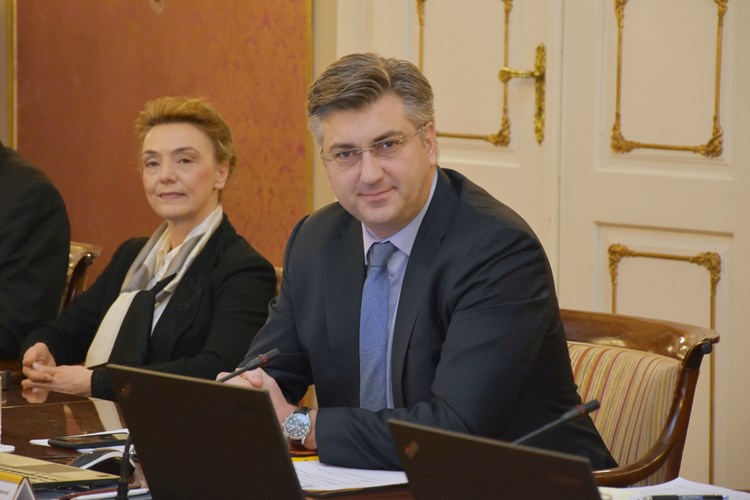- Published: 01.03.2018.
PM Plenkovic: GDP grows steadily, and economic climate in Croatia is at its highest level in the last ten years
Prime Minister Andrej Plenkovic said on Thursday that a lower-than-expected economic growth in 2017 did not affect the state budget and that budget revenues were being collected well, and underscored the latest European Commission report about Croatia's improving economic sentiment in February as encouragement.
Croatia's economy grew in Q4 2017 by 2% from the same period of 2016, which is its slowest growth rate since Q2 2015. According to seasonally adjusted data, Croatia's GDP in Q4 grew 0.1% from the previous quarter, while compared to Q4 2016 it grew 2.2%, the national statistical office (DZS) reported on Wednesday. In 2017 the national economy grew by 2.8%, less than in 2016, when the growth rate was 3.2%.
Economic Sentiment improved significantly in Croatia in February reaching a record high on the wings of optimism in the manufacturing sector and among consumers, according a report released by the European Commission on Tuesday.
"What is encouraging is that Croatia's economic sentiment is at its highest since the EC started monitoring this indicator in Croatia," Plenkovic told a cabinet meeting in Zagreb.
Prime Minister Andrej Plenkovic said on Thursday that the recommendations adopted by the council for dealing with the consequences of undemocratic regimes on how to treat insignia of totalitarian regimes "is a valuable, well-balanced and useful document", which could serve as the starting point for the continuation of dialogue of that topic.
Following these recommendations, the government will, accordingly, adopt its decisions at the time it finds to be appropriate, Plenkovic said.
The document compiled by the 17-member council "is a contribution which we have not had to date in the Croatian public," Plenkovic said.
Thanking the council for its efforts, Plenkovic commended its members- political scientists, lawyers and jurists -- for their intensified, substantiated and prudent dialogue that resulted in the document.
The document consists of two parts, and the first part is the starting point and description about the experiences of the Croatian society in the 20th century when the country was faced with totalitarian regimes.
The government will consider this particularly for activities in connection with education of young generations about those regimes and their repercussions for the society and divisions in the Croatian society, he said.
The second part of the document refers to possibilities of improvement of the legal framework.
The Justice Ministry and the Public Administration Ministry will consider those recommendations, Plenkovic said.
Plenkovic finds it essential that the document clearly condemns totalitarian regimes including the 1941-1945 Nazi-style Ustasha regime, Nazism, Fascist regime and Chetnik movement. He underlined that the recommendations also note that the "For the Homeland Ready" salute had an anti-constitutional character. The salute could be only in exceptional situations and very restrictively be allowed in the future, he said in connection with the council's suggestion that the salute can be used only for commemorative purposes for slain members of Croatian Defence Forces (HOS), the armed wing of the Croatian Party of Rights (HSP) during the Homeland War.
As for suggestions for the observing anti-Fascism from WW2, the recommendations also spoke about the compromising of anti-Fascist values after 1945 and human rights' violations, he added.
Text: Hina
